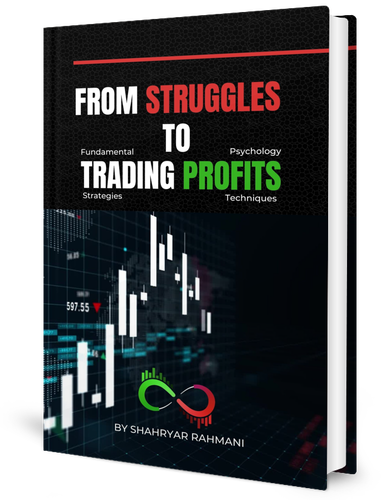Table of Contents
Are you a novice trader and looking for a comprehensive yet full guide on stock trading for beginners? If yes, then you should continue reading.
In this post we are going to take a look at what stock trading is and how you can start your journey more easily and at the very end, we recommend you where to learn stock trading faster.
What Are Stocks and How Do They Work?
So essentially, stocks are shares of ownership in a company. For example, if you buy stocks of Apple or Tesla, you will somewhat become an owner. But because your share is small, it is not noticeable.
Stock prices go up and down according to how well the company does or what happened in the market. If the company does well, the value of your stock may increase, letting you sell it for a profit. But if the company struggles, your stock could lose value.
Overall, Stocks are a way for people to invest in companies and potentially make money, if everything goes well of course and if people know how to sell and buy stocks in a way that they don’t lose close to nothing.
What is Stock Trading?
Stock trading is the action of buying and selling stock on stock exchanges, such as the New York Stock Exchange (NYSE) or NASDAQ. Stock traders aim to buy stocks when they are at their lowest price and sell them when they are at their highest by monitoring the market.
There are four stock trading styles as below:
Day trading:
Day trading is a stock trading style where traders buy and sell stocks within the same day, aiming to profit from short-term price fluctuations.They typically don’t hold positions overnight to avoid overnight risks.
Swing Trading:
In swing trading, traders mostly hold stocks for a few days to several weeks, aiming to profit from short- to medium-term price movements. Swing trading requires constant monitoring and analyzing the market as well as having patience. If you want to know more about Swing Trading you can take a look at How To Master Swing Trading? A Comprehensive Guide.
Position Trading:
Position traders hold stocks for weeks, months, or even years, focusing on long-term trends and fundamental analysis. The goal here is to capitalize on broader market trends and company performance.
Scalping:
Scalping is a trading strategy that involves making small, quick trades to capitalize on very short-term price movements, often within seconds or minutes. Scalping stock traders aim to profit from small price changes, known as “ticks” or “pips,” by executing a large number of trades throughout the trading day.
Why Stock Trading Matters for Beginners?
Stock trading has many advantages for beginner stock traders, and can help them to achieve their financial goals more easily. Let’s take a look at those advantages in a more detailed way:
1. Wealth Building:
With stock trading, beginner traders can start having more income by selling stocks when they are at their highest price. Stock Trading provides an opportunity where people can build wealth over time by investing in companies that have the growth potential.
2. Financial Education:

Because stock trading itself is the center of risk management and balancing financials, it can help many to learn more about these things and increase their knowledge base. Stock Trading encourages financial literacy and empowers individuals to take control of their financial future.
2. Long-Term Goals:
Stock trading encourages beginners to set long-term financial goals, such as saving for retirement, funding education, or achieving financial independence
3. Access to Markets:
Stock trading platforms and brokerage firms have made it easier than ever for beginners to access financial markets and start investing with relatively small amounts of capital.
Also there are Online trading platforms that offer a wide range of educational resources, research tools, and investment options tailored to beginners, empowering them to make informed investment decisions.
4. Inflation Hedge:
Investing in stocks can serve as a hedge against inflation, because stocks historically have provided returns that outpace inflation over the long term. By investing in assets and stocks that have the potential to grow in value over time, beginners can preserve and potentially increase their purchasing power in the face of rising prices.
Key Concepts in Stock Trading
Now that we covered some of the basics for beginner trading, let’s take a look at some of the key concepts of stock trading that you need to know if you are new to the stock world:
Concept | Description |
Stock | Represents ownership in a company. Investors buy and sell stocks to participate in company growth. |
Stock Exchange | Platform where stocks are bought and sold. Examples include NYSE, NASDAQ, and others. |
Market Order | Order to buy or sell a stock at the current market price. |
Limit Order | Order to buy or sell a stock at a specific price or better. |
Bid Price | Price at which buyers are willing to purchase a stock. |
Ask Price | Price at which sellers are willing to sell a stock. |
Spread | Difference between the bid price and the ask price. |
Volume | Total number of shares traded within a specific time frame. |
Liquidity | Ease with which a stock can be bought or sold without causing a significant change in price. |
Volatility | Measure of how much a stock’s price fluctuates over time. |
Bull Market | Period of rising stock prices and investor optimism. |
Bear Market | Period of falling stock prices and investor pessimism. |
Dividend | Portion of a company’s profits distributed to shareholders. |
Earnings Per Share | Company’s net income divided by the number of outstanding shares. |
Price-Earnings Ratio | Ratio of a company’s stock price to its earnings per share. |
Fundamental Analysis | Analysis of a company’s financial health, management, and competitive advantages. |
Technical Analysis | Analysis of stock price movements and trading volumes to forecast future price movements. |
Portfolio Diversification | Spreading investments across different asset classes and industries to reduce risk. |
How to become a pro stock trader?
There are a lots of things that you can do to become a stock trading professional, but there are some basics that you need to learn and understand first, such as:
Start Learning:
First and foremost you need to start educating yourself on stock trading as much as you can. The knowledge that you will gain during this process will be the foundation of what you will become in the near future and if you don’t take this seriously, you will have many problems.
Make a trading plan:
A trading plan is essential if you are looking for long term profits. You need to specify what your goals are and what you need to do to achieve them in the given time. Don’t hesitate to ask any professionals and mentors if you don’t know where to start.
Practice Trading:

Open a paper trading account or use a trading simulator to practice trading without risking real money. You can check out the best trading platforms or trading online platforms on the internet and find what best suits you. This step will help you gain experience, test different strategies, and refine your skills before trading with real capital.
Choose a Trading Platform:
As we mentioned before, you can check the best trading platforms online and find what works for you and your trading style. But remember, make sure that the platform provides access to real-time market data, research, and analysis tools.
Stay Informed:
Start following trading news as often as you can. In this day and age, a lot of events may affect the market. So by keeping up with what happens, you will start to see a pattern and eventually get ahead of the curve sooner and survive.
Start Small:
Start your trading path with a small amount of capital or start using artificial markets when you don’t lose anything but gain experience over time.
Manage Risk:
Implement risk management strategies to protect your capital and minimize losses. This includes setting stop-loss orders, diversifying your portfolio, and avoiding excessive leverage.
Continuous Learning:

Never stop learning:
You need to be updated at all times and know new techniques which will help you eventually.
Emotional Discipline:
Develop emotional discipline and maintain a rational mindset while trading. Avoid making impulsive decisions based on fear or greed at all times. Stick to your trading plan and remain disciplined, even during periods of volatility.
Seek Mentorship to stock trading:
If you think you can’t figure out trading on your own, or you are not sure where you want to be at the end of this journey, it is always recommended to seek mentorship from professionals that have been around the market longer than you. You can have a free discovery call with Meta Trading Club professional traders. In this call, we will go over everything you need to start your trading career with.
Basics Before Trading Starts
Before starting trading effectively, there are some basic terms that you need to know, so let’s explore them first.
Brokerages:
So simply put, brokerages are companies that buy and sell stocks(or other securities such as bonds, options, and mutual funds) on your behalf. They are like the middleman between you and the market.Brokerages provide various services, including executing trades, providing investment advice, offering research and analysis, and managing investment accounts. Some brokerages work and have online platforms, known as online brokerages or discount brokerages, which allow investors to trade securities via the internet. These platforms often offer lower fees and commissions compared to traditional full-service brokerages.
Charting Platforms:
Charting platforms are softwares that show you the price movements of the market in easy-to-read charts. They help you to analyze and decide whether you need to buy or sell your stocks. They are the best choice for beginners, for learning. Popular ones include TradingView and Thinkorswim.
Now, these are said, let’s talk about how to trade properly.
How To Trade Stocks Efficiently?
With brokerages you are like the captain of your plane and can easily control your trades.
But what kind of control do you have and what can you really do?
Let’s explore them:
Market Orders:
Market orders are like auctioning on a piece of art. They immediately execute when the stock is at its best available price. The important thing about market orders is that there is no limit in placing your bid or price, meaning of the price of the stock gets lower after you bid on it, the owner will charge you the exact amount that you entered at the start. In this way, you are guaranteed to get the stock but might lose some because of the market changes.
Limit Orders:
Limit orders are like you are setting rules for your investments in a way that if the price is at a certain amount you buy or sell your stocks. For example, if you want to buy a stock, you can set a limit order to only buy it if the price drops to a certain level that you’re comfortable with. Similarly to that, if you want to sell, you can set a limit order to sell when the price reaches a certain high point.
Stop Orders (or Stop-Loss Orders):
Stop orders are like safety nets. When you set a stop order, you’re basically saying, If the price of my stock falls to a certain point, I want to sell it automatically to limit my losses.
For example, let’s say you own a stock that is 50$ per share and you don’t want to lose more than 6$ per share, so you set a stop order for it. In this way if you stock price down to 44$ or less, the stop order will start to sell your shares immediately.
Stop-Limit Orders:
Stop-limit orders are like having a plan with a backup plan. Here’s how they work:
First, you set a stop price, which is the point at which you want your order to kick in. Then, you set a limit price, which is the minimum price you’re willing to accept for your trade.
Let me make an example, let’s say you want to sell your car and you want to make sure you get a good price for it.
A stop-limit order is like telling your friend, “If someone offers less than $100 for my car, don’t sell it. But if they offer $100 or more, then sell it, but only if they’re willing to pay at least $99.” It’s a way to make sure you don’t sell your toy for too little money.
But, there’s always a risk: If the stock’s price falls really fast and skips over $54, your order might not get filled at all. That’s because once your stop order turns into a limit order, it’ll only execute if the price is at or above your limit price. With this knowledge, you can start trading in a way that you don’t lose much overtime.
How to Understand Stock Market Basics?
To understand stock market basics, you need to start educating yourself either through courses or self-studying. This learning will help you to build a strong foundation before starting stock trading.
But which one is better? Courses or self-study?
Well, the answer is very dependable on your studying style and how you can learn things. If you don’t need someone to check on you and you can discipline yourself to study regularly, then self-study is for you.
But if you think you need to learn from others and need someone to check on you and your process, then Stock Trading for Beginners courses are your thing.
Either way, you need to study regularly and always keep up with the market, to gain the experience that you need.
Where to learn stock trading?
There are many places and websites that you can learn stock trading for beginners from, but you will need to keep an eye on a few things to choose the best instructor and tutor for you.
- Credibility of the Instructor: your instructor needs to have proven experience in the trading market and proven experience. Check their credentials, experience in the financial markets, and any reviews or testimonials from past students.
- Learning Format: Consider the learning format of the course, whether it’s in-person classes, online lectures, video tutorials, interactive exercises, or a combination of these based on your learning style.
- Practical Exercises and Case Studies: Start looking for courses that offer practical exercises, trading simulations, and real-life case studies to help gain experience and knowledge while learning and apply theoretical concepts to real-world trading scenarios.
With these key considerations you can find the best courses for learning stock trading for beginners. You also can check out our incubator program which has all the features that we mentioned and more.
Choosing the Right Stocks to Trade
If you are a beginner, you might wonder what is the best stock to trade at your position. Choosing the right stocks to trade is crucial for success in the stock market. Here are some key factors to consider when selecting stocks to trade.
First and foremost, start to understand your trading strategy. Determine what strategy you want to follow and why. Your strategy will influence the types of stocks you should focus on.
Secondly, choose stocks that are highly liquid. This means they have a high trading volume and tight bid-ask spreads. Liquidity ensures you can enter and exit positions easily without significant price slippage.

Volatility is another factor that you need to keep an eye on. Volatility is the degree of price fluctuation of a stock. Higher volatility stocks offer greater profit potential but also come with increased risk. Map out your risk tolerance and select stocks with volatility levels that align with your trading style.
Overall choosing the best stock for beginners is impossible as it all relies on your trading style and what your goals are.
Risk Management Strategies for Beginner Stock Traders
Now that we know most of the basics about trading stocks, let’s take a look at how you can start practicing risk management and have a great trade.
- Manage Position Sizing: Adjust your position sizes based on the volatility and risk of each trade that you think is correct. Consider the distance to your stop-loss level and the potential reward relative to the risk (risk-reward ratio) when determining the appropriate position size.
- Avoid Overleveraging: Be cautious with leverage, especially as a beginner trader. Avoid excessive borrowing or margin trading, which can amplify both gains and losses. Only use leverage if you fully understand and accept the risks involved and have a well-defined risk management plan in place.
- Diversify Your Portfolio: Try to spread your investments across multiple stocks to avoid facing unwanted risks. Diversification helps mitigate the impact of adverse events on individual stocks and improves overall portfolio resilience.
With these strategies for risk management, you can maintain your losses at minimum even if you are a beginner stock trader.
Tools and Resources for Stock Trading Beginners
Let’s review some of the best trading online platforms that you can use even as a beginner trader.
- Robinhood – Place trades with euros on 30+ crypto at the lowest cost on average-no commission fees-mobile friendly website-offers first stock freely.
- Webull – Zero commissions-Invest in stocks, ETFs, and options, all commission-free. No margin interest or short selling fees for intra-day trading-advanced charting tools and in depth qoutes-offers extended trading hours.
- TD Ameritrade – offers world class trading and investing-$0.00 commissions. No platform fees. No data fees. No trade minimums-user friendly.
- E*TRADE – $0 commissions-Full range of investments-Powerful, intuitive platforms-Automated investment management.
- Fidelity – Full-service brokerage with a range of investment options- Commission-free trading for stocks, ETFs, and options- Extensive research and analysis tools- Retirement planning and investment guidance.
Interactive Brokers
Full-service brokerage with a lot of ways to invest your money- you can trade EFTs,stocks and any other options with minimal commission fees- Low commissions starting at $04 with no added spreads, ticket charges, platform fees, or account minimums- It has tools to help you study and understand the market- They can help you to plan for retirement and where to invest your money.
- Moomoo – You can buy and sell different kinds of investments all in one place- Free commission fee on all US listed EFTs–1.5%cash reward match (on the first $20k transferred in)-7 free fractional shares (with qualified deposit)- You can get advice on how to save for retirement and where to invest your money.
Common Mistakes to Avoid in Stock Trading
Now at the very end, we will explore what are some of the mistakes that you need to avoid as a beginner stock trader.
Lack of Research:
Not doing extensive research before investing in a stock can make some unfixable damages. Always research a company’s financial health, management team, competitive position, and industry trends before making investment decisions.
Trading based on emotions:
Letting emotions like fear and greed dictate and direct your trading decisions can be detrimental. Stick to your trading plan and avoid making impulsive decisions based on emotions only to make a quick pocket money.
Chasing Hot Tips:
Relying on hot tips or rumors from friends, social media, or unreliable sources is very risky and unwise. Make investment decisions based on thorough analysis and your own research and knowledge rather than speculation.
Over trading:
Excessive trading can lead to higher transaction costs and diluted returns. Focus on quality over quantity and avoid trading too frequently.
Not Learning from Mistakes:
Every trader, professional or not, makes mistakes, but successful traders learn from them. Analyze your trades, even the successful ones, identify mistakes, and adjust your strategy accordingly to improve over time.
Last Words
Beginners need to invest more time in the new thing they are learning and most times they get disinterested or unmotivated after a few falls. But you need to remember, even the professional stock traders have once been a beginner and all they did was having patience through this process and trusting their goals.
In this post, we talked about what stock trading is and what you can do if you are a stock trading beginner, and Where to learn stock trading for beginners. So if you are a beginner and want to know more, make sure to check out our other blog posts and social media, as we go through all trading stock basics for novice traders.
Frequently asked question
Simply put, stock trading is the process of buying and selling the shares of big companies.
To get started with stock trading, you’ll need to open a brokerage account with a reputable online broker. When your account is set up, you can deposit funds and start buying and selling stocks through the broker’s trading platform.
As a stock trader beginner, the amount of money needed to start trading stocks differs depending on the broker and your trading strategy and your overall goals.Many brokers have no minimum deposit requirements, but it’s recommended to start with an amount you can afford to lose and over time increase your investment as you gain experience.
A market order is an order to buy or sell a stock at the current market price, while a limit order is an order to buy or sell a stock at a specific price or better.
Market orders often are executed immediately, while limit orders are executed only if the stock reaches the specified price.
Stock trading overall, is risky and not suitable for everyone.It requires time, patience, discipline, and a willingness to learn. Before getting started, consider your financial goals, risk tolerance, and investment experience to determine if stock trading is right for you.
Staying informed about the stock market is fairly easy. Only thing you need to do is follow some reputable sources about the market and be updated all the time. Check out Meta Trading Club’s FREE LESSON and read “From Struggles to Trading Profits” to start your trading journey.













